Unborn
IT WOULD MAKE SENSE TO SAY DEATH TOO IS Buddha, for death is also a great teacher. Although the emergence and vanishing of tzu-jan’s generative process is all around us—woodpeckers tapping on hollowed out trees and tin mailboxes, thoughts appearing and vanishing, gusting wind and changing seasons—it isn’t easy to experience oneself as integral to that process. That is, at bottom, a large part of what Ch’an practice is about: wu-wei practice in meditation, in sangha-case training, or simply in day-to-day life. But facing the prospect of death without illusions, as ancient Chinese artist-intellectuals did, our belonging to tzu-jan occurrence becomes an overwhelmingly real and unavoidable fact. For in death we vanish absolutely back into tzu-jan’s process of appearance and disappearance. And so, death reveals yet again the Ch’an insight that practice is unnecessary because we are always already enlightened.
In the Taoist/Ch’an framework, death is a return home, a return to the generative tissue, to (as Lao Tzu says) the “nurturing mother,” the “mother of all beneath heaven.” And there was solace in that. But seen at a deeper level, we never leave home. Absence and Presence are a single existence-tissue: the ten thousand things are not born out of Absence, never separate from Absence. And it’s the same for us. It might seem that we are born out of Absence, that in death we return to Absence, which would be homecoming enough. And it makes sense to speak of it that way, as Purport Dark-Enigma does when he tells his disciples that they will “return to perennial Absence.”34 But however separate the center of identity may seem, with its thought and emotion and memory, it too is part of existence-tissue Absence, wholly unborn, as Patriarch Sudden-Horse Way-Entire said in a poem:
The inner-pattern and this world it shapes: they move unhindered, and so it is that everything born is unborn.
Our “unborn” lives are simply ripples in the movement of ch’i-tissue. And so, death was seen not as a grand personal tragedy, but as a natural transition in that movement. Death is only a problem when seen from the self-involved perspective of a personal identity that is “born.” But as we have seen, Ch’an reveals the existence-tissue itself as our truest self; so there is no death, only a continuation of the great transformation.
Unborn is sometimes 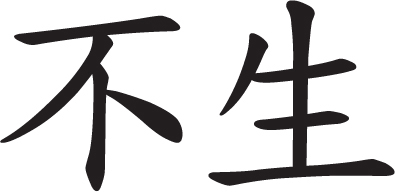 , meaning simply “not born.” But it is often
, meaning simply “not born.” But it is often 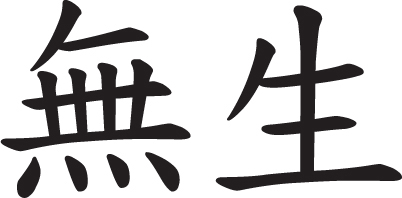 , as when Sixth Patriarch Prajna-Able speaks of “awakening to the sudden dharma of non-birth.”
, as when Sixth Patriarch Prajna-Able speaks of “awakening to the sudden dharma of non-birth.” 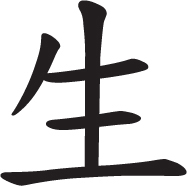 can mean either “born” or “living.” And as in
can mean either “born” or “living.” And as in 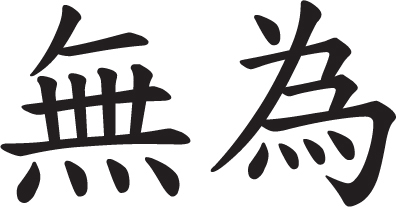 (wu-wei: no/Absence-action),
(wu-wei: no/Absence-action), 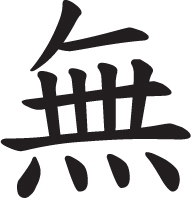 here plays once again on its double meaning: “not” and “Absence.” Hence,
here plays once again on its double meaning: “not” and “Absence.” Hence, 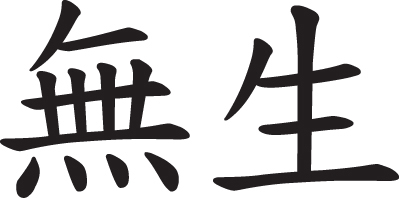 becomes: “not/Absence + born/alive.” From this comes “Absence-born” or “Absence-alive,” describing our most essential identity as Absence itself. This suggests the cosmological/ontological depths of the simpler reading, “non-birth” or “unborn,” and gives a second reading to Prajna-Able’s statement: “awakening to the sudden dharma of Absence-born/alive.”
becomes: “not/Absence + born/alive.” From this comes “Absence-born” or “Absence-alive,” describing our most essential identity as Absence itself. This suggests the cosmological/ontological depths of the simpler reading, “non-birth” or “unborn,” and gives a second reading to Prajna-Able’s statement: “awakening to the sudden dharma of Absence-born/alive.”
At these depths, we are each a fleeting form conjured in Absence’s generative process of perpetual transformation: not just born out of it and returned to it in death, which still assumes a center of identity detached from the Cosmos and its processes, but never out of it, totally unborn. Indeed, our fullest identity, being unborn, is Absence itself, is therefore deathless because it is all and none of earth’s fleeting forms simultaneously. From this comes Yellow-Bitterroot Mountain’s recognition that
if your mind is unborn and thoughts arise—it’s tzu-jan, not illusion. That’s why they say “When mind is born, all sorts of dharmas are born. When mind is extinguished, all sorts of dharmas are extinguished.”35
And elsewhere, Yellow-Bitterroot Mountain extends this to the heart of Ch’an wisdom: “when mind is unborn, tzu-jan itself becomes the great wisdom.”36
The double meaning of 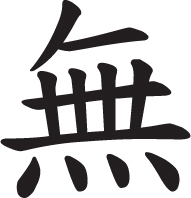 deepens Sangha-Fundament’s already remarkably condensed declaration that we’ve read as “a sage’s mastery of emptiness perfectly Absence-born/alive: that is the perspective of prajna-wisdom’s dark-enigma mirror” (this page), for we can now read it as “a sage’s mastery of emptiness perfectly unborn: that is the perspective of prajna-wisdom’s dark-enigma mirror.” And with its double reading, Sangha-Fundaments’s declaration explicates Yellow-Bitterroot Mountain’s teaching that “to penetrate the depths of Ch’an’s Way, you must inhabit the full expanse of unborn mind.”
deepens Sangha-Fundament’s already remarkably condensed declaration that we’ve read as “a sage’s mastery of emptiness perfectly Absence-born/alive: that is the perspective of prajna-wisdom’s dark-enigma mirror” (this page), for we can now read it as “a sage’s mastery of emptiness perfectly unborn: that is the perspective of prajna-wisdom’s dark-enigma mirror.” And with its double reading, Sangha-Fundaments’s declaration explicates Yellow-Bitterroot Mountain’s teaching that “to penetrate the depths of Ch’an’s Way, you must inhabit the full expanse of unborn mind.”
This concept of non-birth infuses every aspect of Taoist/Ch’an thought. We know our unborn nature directly in meditation, for in empty-mind one belongs without any separation to the Absence-tissue. Empty mirror-mind perception reveals our unborn nature through that identity of inner and outer in which empty awareness and the expansive presence of existence are whole. And whatever form it takes—meditation, sangha-case training, day-to-day life—wu-wei as practice returns us to our “unborn” nature, for in it we move as integral to generative Absence.
Yellow-Bitterroot Mountain considered non-birth the essence of Ch’an: “To penetrate the depths of Ch’an’s Way, you must inhabit the full expanse of unborn mind.”37 Non-birth is a profound way of understanding the claim that we are always already enlightened. As we have seen, Prajna-Able says directly that understanding non-birth wholly is tantamount to awakening when he speaks of “awakening to the sudden dharma of non-birth.” And finally, true to the Ch’an spirit of dismantling itself, Sudden-Horse Way-Entire declared that once we master non-birth we have no need for Ch’an:
Once you understand mind to its furthest boundaries with perfect clarity, even frenetic tangles of thought are unborn [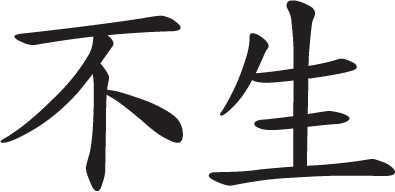 ]. Once frenetic tangles of thought are unborn [
]. Once frenetic tangles of thought are unborn [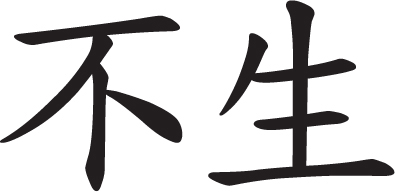 ], you’ve mastered the patient dharma of non-birth [
], you’ve mastered the patient dharma of non-birth [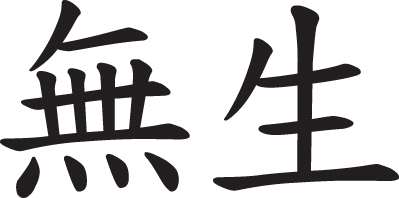 : hence also “the patient dharma of Absence-born/alive”]. It was like this at the beginning and it’s like this now, so why cultivate the Way or sit in Ch’an meditation? Not cultivating and not sitting: that is the clear and pure Ch’an of a Buddha in existence-tissue arrival.38
: hence also “the patient dharma of Absence-born/alive”]. It was like this at the beginning and it’s like this now, so why cultivate the Way or sit in Ch’an meditation? Not cultivating and not sitting: that is the clear and pure Ch’an of a Buddha in existence-tissue arrival.38
This provides another approach to the integration of self-identity and Tao/Cosmos. If we are unborn, whatever meaning we create is also unborn. Meaning is the Cosmos orienting itself. It is not a separate transcendental realm, a stable outside measure of existence. It is the Cosmos’s way of knowing itself; and so, is no different than any other meaningless twist in the vast movement of the Cosmos: the twist of galaxies, the tectonic upthrust of mountain ranges, seasons, egrets hunting river shallows all patience. Meaning is meaningless, a principle informing the concept of ch’i-thought/mind—the “intentionality/desire/intelligence” that shapes the ongoing cosmological process of change and transformation, and of which human intelligence is one particular manifestation. The Cosmos shapes itself into mountain and river, egrets startling up into flight and pear blossoms tumbling in the evening wind, and they explain nothing, mean nothing. It shapes itself into linguistic meaning the same way, and meaning explains nothing.
It makes sense that the definition of Ch’an is meditation, for meditation reveals virtually all of Ch’an’s insights. And we find that true here again, for the meaninglessness of meaning is manifest in the way thoughts emerging from a generative emptiness are seen as the same tzu-jan process as the ten thousand things emerging in the empirical world. An idea emerges the way a mountain range emerges. Again, ordinary mind no different than the grand cosmological Tao, as we have seen Patriarch Sudden-Horse Way-Entire say with complete concision: “Ordinary mind is the Way.” And as we have also seen, Ch’an meditation aspires finally not to some pure nirvana-tranquility, for it embraces the movement of thought as tzu-jan occurrence, as meaning that is meaningless. In the end, meaningless meaning reveals another dimension to Ch’an’s skepticism about the explanatory power of words and ideas. Isn’t meaninglessness what meditation and sangha-case practice finally reveal? This whole system of Ch’an understanding also explains nothing, means nothing, returning us in the end to dark-enigma. Or what it explains, in its dark-enigma meaninglessness, is that our original-nature is unborn. And of course, to “see original-nature” is to be awakened.
